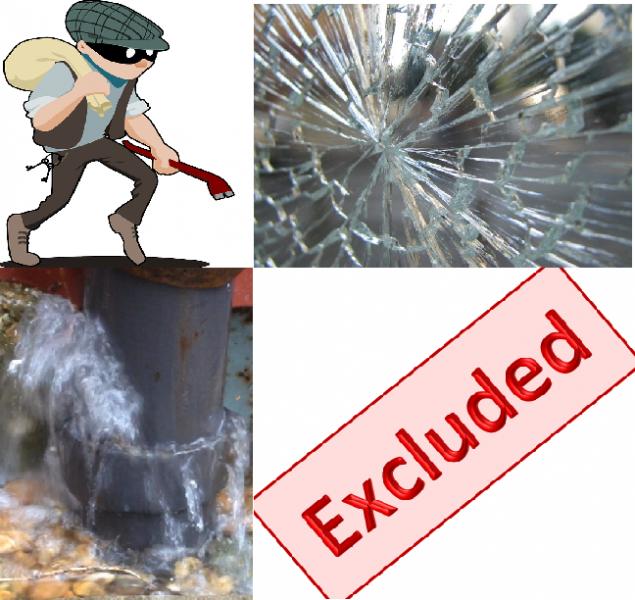Household insurance policies are designed to protect a home and its contents during the time it is being lived in by the householder, rather than providing insurance when a home is unoccupied. So what happens to the policy cover when the house becomes empty, in the event of the death of the householder, or if they move permanently into care?
Mistake No 1- No restrictions are applied until at least 30 days have elapsed
It is commonly assumed that every household insurance policy will automatically give up to 30, or in some cases 60 days full cover before any restrictions in cover are applied. This is not the case.
One insurer who specialises in providing insurance policies for the elderly, has the following definition in their latest policy wording (Oct 2013):
“Unoccupied – A house not lived in or not intended to be lived in for more than 60 days in a row.”
This means that in the event of death of the householder (or if they have moved into care), the restrictions and exclusions imposed by the policy wor
ding will be applied from day one, as the property is not intended to be lived in for more than 60 days. Therefore the following exclusions apply from Day 1.
That is, the day the property becomes permanently unoccupied:
Exclusions
- Theft

- Attempted theft
- Malicious damage
- Burst pipes
- Escape of water
- Trace and access
- Leaking oil
- Loss of metered oil or water
- Accidental damage to sanitary fixtures
Furthermore, the insurer specifically states that they may void a policy completely if they haven’t been informed that the property has become unoccupied, creating a risk of no insurance cover for any incident unless and until they have been notified and have agreed a change in occupancy..
The above exclusions represent a significant proportion of the protection being removed. According to the Association of British Insurers, these perils account for 47% of the total claims paid out for domestic property. When properties are unoccupied, the risks are magnified further. For example, a typical water damage claim caused by a burst pipe can be five times higher when left undiscovered for longer periods of time in an empty property. A burst pipe claim in a modest home will easily exceed £60,000.
Theft risks also increase, with metal thieves targeting empty properties and causing tens of thousands of pounds damage by ripping out boilers and pipes.
Mistake No 2 – Standard Terms means standard cover
Often, an insurer will confirm that they are happy to continue to insure a property following notification from the probate practitioner that the house has become unoccupied. They may confirm that they are not imposing additional terms and that ‘standard terms’ will continue to apply.
Unless a written endorsement has been received amending the policy wording, the standard terms that have been confirmed will also feature the standard restrictions in cover, so the exclusions listed above will still normally apply.
Mistake No 3 – It is quicker and cheaper to keep the existing policy in force
If there is an existing household policy in force, you will need to:
a) Check adequacy of amounts insured and cover
b) Inform insurer of change in occupancy and obtain their requirements for continuing cover
c) Check revised documents and terms to be applied
d) Scrutinise cover again at renewal (if it is offered), as insurers often amend terms
e) Arrange alternative cover if existing policy is not adequate.
After you have contacted the existing insurer and advised them of the change in occupancy, you will need to wait for a written endorsement to arrive before assessing the adequacy of the existing amounts insured and the suitability of the cover for present and future needs. You will then need to make arrangements for implementation of any additional security and maintenance provisions imposed by the insurer as a condition of continuing cover, which may still be restricted.
Specialist unoccupied property insurance
There is no hiding from the fact that a specialist unoccupied property insurance policy will in most cases be more expensive than the home insurance policy it replaces. However, the advantages more than justify this cost. You can be confident that you have done all you can to protect the property with the most comprehensive product available, protecting you from the wrath of the householder’s family if things take a turn for the worse. Furthermore, a quotation will in most cases take less than 6 minutes from call to cover, meaning this aspect of the estate has been concluded in a fraction of the time it often takes to negotiate with a household insurer, who will often refuse to offer renewal, putting you back to square one just a few months later.
It is therefore good practice to implement the immediate arrangement of a specialist unoccupied property insurance policy in every case, regardless of the existence of a household policy.




